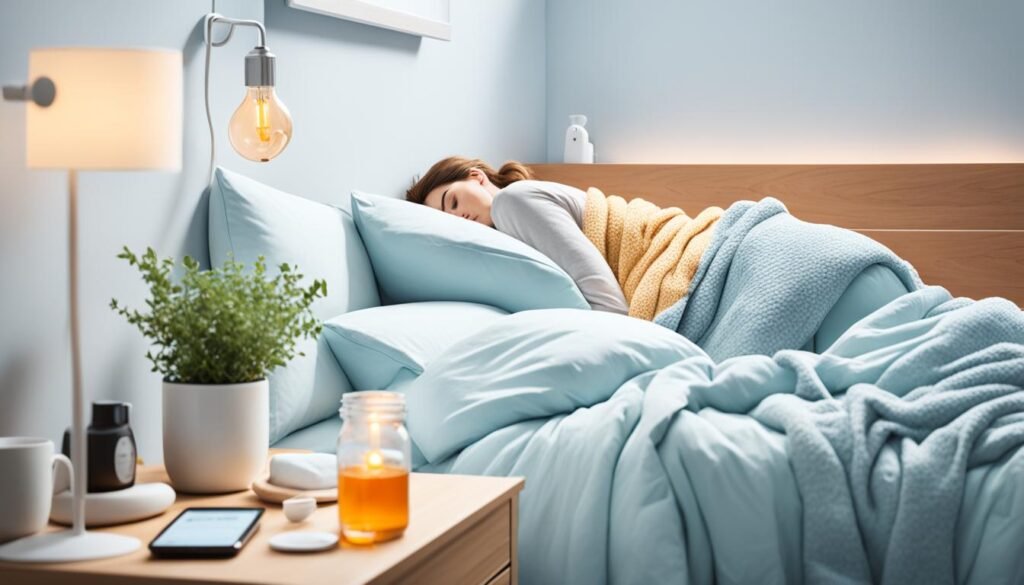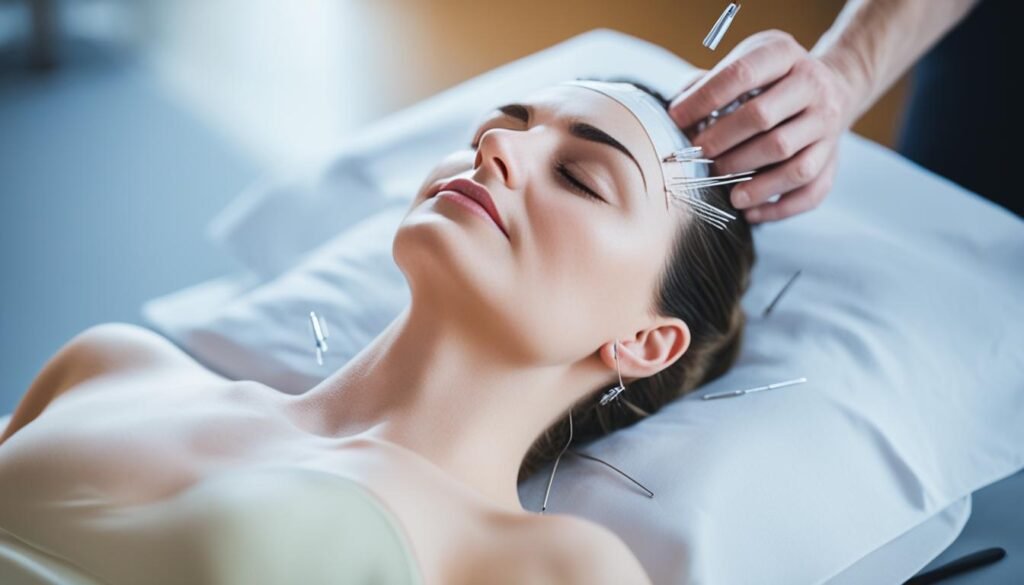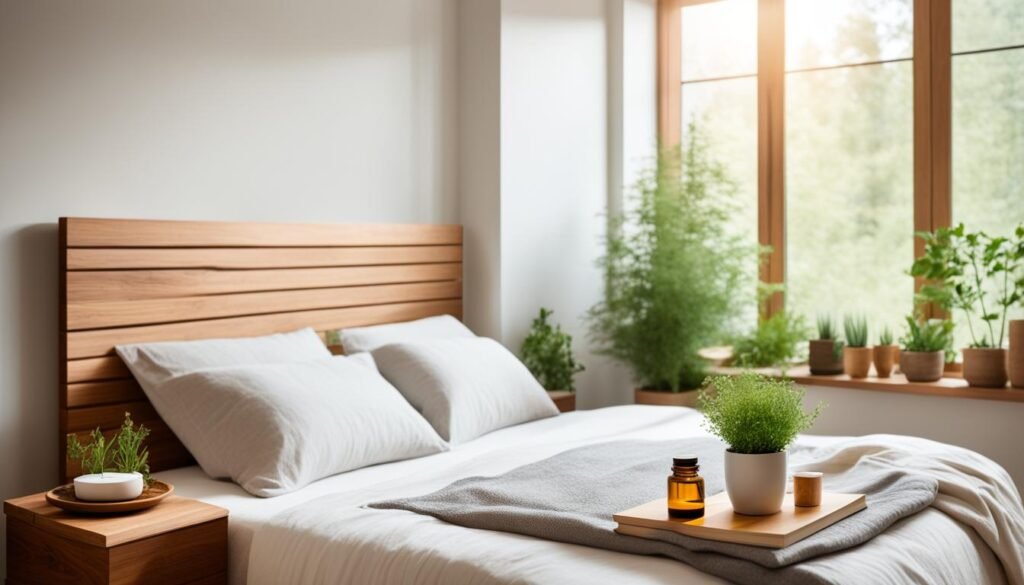According to the Centers for Disease Control and Prevention (CDC), more than one-third of U.S. adults routinely sleep fewer than six hours a night. Lack of quality sleep can negatively affect your memory, concentration, mood, and increase the risk of depression, obesity, type 2 diabetes, heart disease, and high blood pressure. However, there are easy, natural fixes that can improve your sleep without the need for prescription sleep aids. These include warm beverages, exercise, melatonin supplements, optimal sleep environment, and consistent sleep routines.
The Importance of Quality Sleep
Sleep quality is a critical component of overall health and well-being. Unfortunately, more than 60 million Americans suffer from poor sleep quality, a growing concern that extends far beyond mere inconvenience. The impacts of lack of sleep can significantly affect both our emotional and physical health.
Lack of Sleep: A Growing Concern
Disturbed sleep patterns can have far-reaching consequences. Sleep deprivation has been linked to a host of issues, including impaired memory, difficulty concentrating, and mood disturbances. Additionally, studies have shown that a lack of quality sleep increases the risk of developing serious health conditions such as depression, obesity, type 2 diabetes, heart disease, and high blood pressure.
Negative Effects of Sleep Deprivation
When we don’t get enough sleep quality, our cognitive abilities can suffer. Memory, concentration, and mood can all be negatively impacted, hampering our ability to perform at our best. Furthermore, sleep deprivation has been associated with a heightened risk of developing a range of chronic health problems, underscoring the importance of establishing healthy sleep habits for overall well-being.
Warm Beverages for Better Sleep
Certain warm beverages can be a gentle and natural way to improve sleep quality. From the soothing effects of warm milk to the calming properties of chamomile tea and the sleep-promoting benefits of tart cherry juice, these natural remedies offer a healthy alternative to sleep medications.
The Magic of Warm Milk
Warm milk is a time-honored sleep aid, and for good reason. Milk contains chemicals that simulate the effects of tryptophan, a substance involved in the sleep-wake transition. The warm temperature of the milk can also have a relaxing effect, making it easier to drift off to sleep. Sipping on a warm glass of milk before bedtime can be a comforting way to prepare your body for a restful night’s sleep.
Chamomile Tea: A Soothing Nightcap
Chamomile tea is widely recognized for its calming properties. The herb is believed to contain flavonoids that may interact with benzodiazepine receptors in the brain, which are involved in the sleep-wake cycle. Drinking a cup of chamomile tea before bed can promote relaxation and support a healthy sleep pattern.
Tart Cherry Juice: A Natural Sleep Aid
Tart cherry juice has emerged as a natural sleep aid due to its potential to support melatonin production. Melatonin is a hormone that plays a crucial role in regulating the sleep-wake cycle. Consuming tart cherry juice may help maintain a healthy sleep cycle and improve overall sleep quality.
These warm beverages offer a gentle and natural way to enhance sleep without the need for prescription sleep aids. By incorporating them into your nighttime routine, you can take steps towards a more restful and rejuvenating sleep experience.
Exercise for Improved Sleep
Physical activity can have a profound impact on your sleep quality, though the exact mechanisms are not yet fully understood. Engaging in moderate aerobic exercise, such as brisk walking, jogging, or cycling, can boost the amount of slow wave (deep) sleep you experience, which is essential for physical and cognitive restoration.
The Benefits of Moderate Aerobic Exercise
Research has shown that regular moderate aerobic exercise can significantly improve sleep quality and duration. By elevating your heart rate and stimulating the release of endorphins, aerobic exercise helps regulate your body’s natural sleep-wake cycle and promote deeper, more restful sleep. This type of physical activity can be particularly beneficial for individuals struggling with insomnia or poor sleep patterns.
Timing Your Workout for Better Sleep
While exercise is generally beneficial for sleep, the timing of your workout can play a crucial role. Aerobic exercise releases endorphins and stimulates the body, which can keep you awake if performed too close to bedtime. To ensure your exercise routine supports better sleep, aim to complete your workout at least two hours before your desired bedtime. This allows your body to wind down and transition into a relaxed state, priming you for a restful night’s sleep.
Melatonin Supplements: A Natural Sleep Regulator
Melatonin is a hormone naturally released by the brain four hours before we feel sleepy, triggered by the body’s response to reduced light exposure. However, exposure to artificial light from electronic devices can prevent melatonin release, making it hard to fall asleep. Melatonin supplements are available as an over-the-counter option to help regulate the sleep-wake cycle.
Understanding Melatonin’s Role
The production and release of melatonin are closely tied to the body’s circadian rhythms, the 24-hour internal clock that regulates many physiological processes, including the sleep-wake cycle. As the sun sets and darkness falls, the brain’s pineal gland releases melatonin, signaling to the body that it’s time to prepare for sleep. Exposure to bright light, particularly from electronic devices, can disrupt this natural process, leading to difficulties falling and staying asleep.
Selecting a Quality Supplement
When considering melatonin supplements to address sleep issues, it’s important to select a high-quality product from a reputable brand. Unlike prescription sleep medications, the melatonin supplement quality is not strictly regulated by the FDA, and the dosage and ingredients can vary significantly between manufacturers. To ensure consistent results, it’s best to stick to a single brand of melatonin supplements and follow the recommended dosage guidelines.
Creating an Optimal Sleep Environment
To achieve quality sleep, it’s essential to create a sleep-conducive environment. Two critical factors to consider are temperature control and darkness.
Temperature Control for Better Sleep
The ideal temperature for a bedroom is between 65 and 72 degrees Fahrenheit. This range helps promote the body’s natural temperature drop, which signals the onset of sleep. Women experiencing menopausal hot flashes should keep the room as cool as possible and wear breathable fabrics to bed to avoid disruptions from fluctuating body temperatures.
Embracing Darkness for Quality Rest
In addition to temperature control, darkness is crucial for quality rest. The latest recommendation is to use a flashlight instead of turning on the bathroom light during nighttime bathroom breaks, as even small amounts of light can disrupt melatonin production and the sleep-wake cycle. Maintaining a dark, cool, and comfortable sleep environment is essential for an optimal sleep environment, helping to ensure temperature for sleep and darkness for sleep.
Establishing a Consistent Sleep Routine
Developing a consistent sleep routine is an effective strategy for improving sleep quality. Going to bed and waking up at the same time every day, even on weekends and holidays, helps establish your internal sleep schedule and reduces the amount of tossing and turning required to fall asleep. A predictable bedtime routine signals to your body that it’s time to wind down and prepare for sleep.
Maintaining a consistent sleep routine can have numerous benefits. It helps regulate your body’s circadian rhythm, the internal clock that controls your sleep-wake cycle. When you go to bed and wake up at the same time each day, your body naturally adjusts and becomes accustomed to this pattern, making it easier to fall asleep and wake up feeling refreshed.
Moreover, a consistent sleep schedule can improve the quality of your sleep. By going to bed and waking up at consistent times, you’re more likely to experience deeper, more restorative sleep. This, in turn, can boost your energy levels, improve your mood, and enhance your overall well-being.

To establish a consistent sleep routine, start by setting a regular bedtime and wake-up time, and stick to it, even on weekends. Engage in relaxing activities before bed, such as reading a book, taking a warm bath, or practicing light stretching, to signal to your body that it’s time to wind down. Avoid screens and stimulating activities in the hours leading up to your bedtime. By creating a consistent and calming sleep routine, you can train your body to fall asleep more easily and enjoy better quality sleep.
natural remedies for better sleep
In addition to warm milk, chamomile, and tart cherry juice, other herbal teas may have sleep-promoting properties. Certain herbs like valerian root, passionflower, and lavender are believed to have a calming effect that can aid in relaxation and sleep.
Herbal Teas and Their Sleep-Promoting Properties
Valerian root, for instance, is a well-known natural remedy for insomnia, as it contains compounds that may interact with the brain’s gamma-aminobutyric acid (GABA) receptors, promoting relaxation and improved sleep quality. Passionflower, on the other hand, is thought to have a mild sedative effect, potentially helping to reduce the time it takes to fall asleep. Lavender, a fragrant herb often used in aromatherapy, has been shown to have a calming effect that can enhance sleep.
Essential Oils for Relaxation and Sleep
Essential oils, such as lavender, chamomile, and ylang-ylang, may also be used for their aromatherapeutic benefits to promote relaxation and better sleep. The calming scents of these oils can trigger the body’s natural response, helping to reduce stress and anxiety, which are common contributors to sleep issues. Incorporating essential oils into your bedtime routine, through a diffuser or topical application, may be a gentle and natural way to wind down and prepare for a restful night’s sleep.
Relaxation Techniques for Deeper Sleep
Achieving quality sleep is crucial for overall health and well-being, but for many individuals, stress and anxiety can be significant roadblocks. Fortunately, there are effective relaxation techniques that can help you enter a state of calm and promote deeper, more restful sleep. Two of the most popular and well-studied methods are mindfulness meditation and progressive muscle relaxation.
Mindfulness Meditation for Better Sleep
Mindfulness meditation focuses on the present moment, encouraging you to concentrate on your breath and quiet the chatter of your mind. By turning your attention inward and away from the stressors of the day, mindfulness meditation can help reduce anxiety and promote a sense of calm, making it easier to drift off to sleep. Regular practice of mindfulness meditation has been shown to improve sleep quality, duration, and overall sleep hygiene.
Progressive Muscle Relaxation
Another effective relaxation technique for sleep is progressive muscle relaxation. This method involves systematically tensing and releasing different muscle groups throughout the body, inducing a state of deep relaxation. By focusing on the physical sensations of tension and release, your mind can let go of any lingering worries or anxieties, allowing you to transition more easily into a peaceful slumber.
Incorporating these relaxation techniques for sleep, such as mindfulness meditation and progressive muscle relaxation, can be a powerful way to address the root causes of sleep difficulties and improve your overall sleep quality. By taking the time to quiet your mind and relax your body, you can pave the way for deeper, more restful sleep and better overall health.
Acupuncture: An Alternative Approach to Sleep
Acupuncture, the practice of inserting tiny needles into the skin, may be a beneficial alternative to sleep medication for some individuals. While the safety and effectiveness of acupuncture for treating insomnia haven’t been thoroughly studied, some research suggests it can significantly improve acupuncture for sleep.
The Science Behind Acupuncture for Sleep
The proposed mechanism involves acupuncture’s ability to influence the body’s natural sleep-wake cycles and reduce stress and anxiety, which can interfere with acupuncture science for sleep. By targeting specific points on the body, acupuncture is believed to stimulate the release of neurotransmitters and hormones that promote relaxation and improve sleep quality.
Acupuncture may work by regulating the production of melatonin, a hormone that plays a crucial role in the sleep-wake cycle. Some studies have found that acupuncture can increase melatonin levels, helping to restore the body’s natural sleep-wake rhythm and improve overall sleep quality.
Additionally, acupuncture has been shown to have a calming effect on the nervous system, reducing stress and anxiety that can contribute to insomnia. By promoting a state of relaxation, acupuncture may help individuals fall asleep more easily and experience more restful sleep throughout the night.

Conclusion
Establishing healthy sleep habits and incorporating natural remedies can be an effective way to improve sleep quality without the need for prescription sleep aids. From warm beverages like chamomile tea and tart cherry juice to melatonin supplements and relaxation techniques such as mindfulness meditation and progressive muscle relaxation, there are many gentle solutions to explore.
By creating an optimal sleep environment with the right temperature and minimal light exposure, maintaining a consistent sleep routine, and even trying alternative therapies like acupuncture, you can take steps to sleep more soundly and support your overall health and well-being. These natural remedies for better sleep, combined with good sleep hygiene, can help you feel more rested, focused, and energized throughout the day.
Prioritizing your sleep is an investment in your long-term physical and mental health. By incorporating these various natural approaches, you can become an empowered advocate for your own sleep quality and enjoy the numerous benefits of quality rest.


